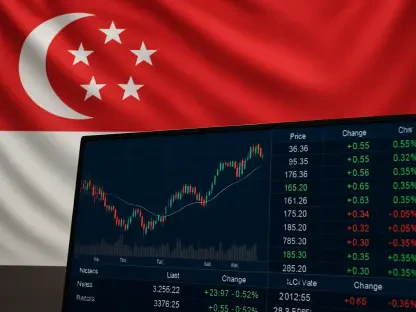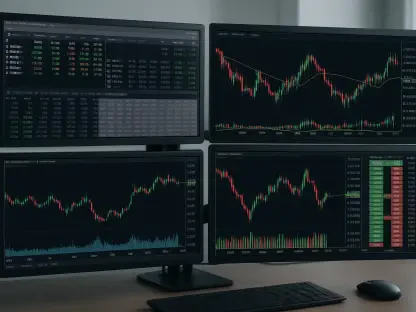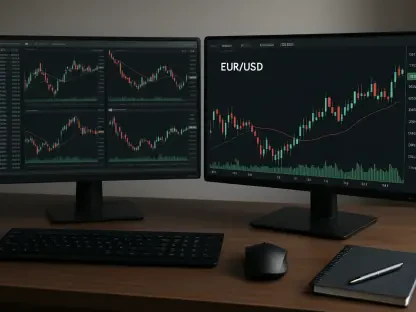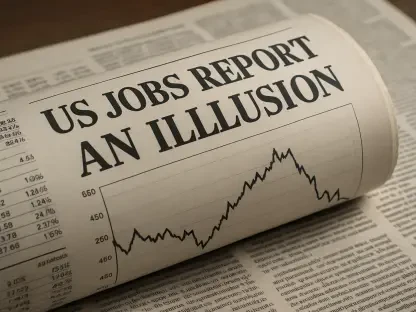In a world where economic uncertainty looms larger than ever, a striking number of top executives are turning their focus to cutting-edge solutions to steer their companies through turbulent times, as revealed by a recent survey of 1,350 CEOs from major markets and sectors, representing firms with annual revenues over US$500 million. The survey shows a sharp decline in confidence about the global economy, hitting a five-year low of 68%. Yet, amidst this gloom, there’s a palpable sense of optimism about individual company prospects, with 79% of leaders expressing faith in their own organizations’ futures. This intriguing contrast sets the stage for a deeper look into how business leaders are navigating challenges by doubling down on transformative technologies, particularly artificial intelligence (AI), while recalibrating strategies to address both internal strengths and external risks. The insights paint a picture of resilience and adaptability in the face of daunting global headwinds.
Economic Outlook: A Tale of Contrasting Sentiments
As global economic confidence dips to its lowest in half a decade, the pessimism among CEOs stands in stark contrast to their belief in their own companies’ potential for growth. Only 68% of surveyed leaders feel positive about broader economic conditions, a noticeable drop from last year’s 72%. However, when it comes to their own enterprises, 79% remain bullish, with 61% projecting profit growth of at least 2.5% over the next three years. This divergence suggests a shift toward inward focus, where executives are prioritizing internal capabilities over external market conditions. The shorter timeframe for expected returns on investment—67% now anticipate results within one to three years compared to a longer horizon previously—further underscores a drive for quicker, more tangible outcomes. This mindset reflects a pragmatic approach to weathering economic storms by leveraging company-specific strengths rather than relying on unpredictable global trends.
The economic unease is not without its strategic implications, as leaders adjust their expectations and timelines to align with a volatile landscape. Beyond the numbers, there’s a clear recognition that global challenges cannot be ignored, yet the emphasis remains on fortifying internal operations. A significant portion of CEOs are channeling resources into areas that promise stability and growth, even as they brace for potential downturns. This cautious optimism is evident in how 72% have revised growth plans to mitigate shocks, indicating a proactive stance toward uncertainty. While broader market concerns linger, the confidence in individual performance acts as a buffer, pushing leaders to seek innovative ways to maintain momentum. The focus on shorter investment cycles also hints at an urgency to adapt swiftly, ensuring that their organizations remain agile in a rapidly shifting economic environment.
AI as the Cornerstone of Corporate Strategy
Artificial intelligence has emerged as a pivotal force in corporate planning, with 71% of CEOs ranking it as a top investment priority, a rise from 64% last year. This surge highlights a growing consensus that AI is no longer just an experimental tool but a fundamental driver of efficiency and expansion. A substantial 69% of leaders are dedicating 10–20% of their budgets to AI initiatives, signaling a deep commitment to integrating this technology across operations. The impact on workforce dynamics is profound, as 59% are redeploying staff into AI-enabled roles, while 41% acknowledge the likelihood of layoffs due to automation. This dual effect underscores the transformative power of AI, reshaping not only business models but also the very nature of work. The enthusiasm for AI is tempered by challenges, yet the trajectory points to its central role in future-proofing companies.
Despite the momentum behind AI adoption, significant hurdles remain, particularly around ethics and regulation. A notable 59% of CEOs express concern over ethical issues tied to large-language models, while 50% point to inadequate regulatory frameworks as a barrier to responsible implementation. Additionally, 77% believe that workforce readiness and upskilling in AI will be critical to prosperity over the next three years, yet 70% cite fierce competition for talent as a limiting factor. These concerns reveal a nuanced perspective—while AI offers immense potential, it also demands careful navigation of risks. The drive to harness this technology is clear, but so is the need for robust guidelines and skilled personnel to ensure sustainable integration. As companies pour resources into AI, balancing innovation with accountability becomes a defining challenge for leadership.
Strategic Adaptations to Market Volatility
Navigating a volatile global market has prompted CEOs to rethink growth strategies, with 72% revising plans to cushion against potential disruptions. Mergers and acquisitions (M&A) are viewed as a key lever, with 89% of leaders seeing moderate to significant impact on their strategies over the next three years. M&A serves as a pathway to diversify revenue streams, expand geographically, and achieve cost efficiencies during uncertain times. Investment priorities also reflect a risk-averse approach, with substantial allocations toward cybersecurity and digital resilience at 39%, regulatory compliance at 36%, and AI integration at 34%. This blend of offensive and defensive spending illustrates a calculated effort to balance innovation with stability. The focus on safeguarding operations while pursuing growth opportunities highlights a pragmatic mindset among executives facing unpredictable market forces.
Beyond immediate tactics, the broader strategic landscape reveals a commitment to resilience through diversified approaches. The emphasis on M&A as a growth tool is complemented by a cautious investment strategy that prioritizes protecting core operations. Cybersecurity, for instance, emerges as a critical area as digital transformation accelerates, ensuring that innovation does not come at the expense of vulnerability. Meanwhile, regulatory compliance reflects an awareness of the complex legal environments in which global firms operate. These priorities collectively signal a shift toward building robust foundations that can withstand external shocks. As CEOs adapt to volatility, the interplay between risk management and strategic expansion becomes a cornerstone of their planning, ensuring that their organizations remain competitive in a challenging economic climate.
Sustainability Goals in a Pragmatic Light
Environmental, social, and governance (ESG) objectives continue to hold importance for business leaders, though with a realistic reassessment of timelines and challenges. Around 61% of CEOs report being on track to meet 2030 net-zero targets, up from 51% last year, indicating progress in sustainability efforts. However, obstacles remain, especially in decarbonizing supply chains, a concern for 25% of respondents. Additionally, 21% highlight a lack of skills and expertise as a barrier, while only 11% see cost as a major issue. This suggests that while the commitment to ESG persists, many companies are adjusting interim milestones to more achievable deadlines. The focus is shifting toward practical solutions that align with long-term goals, reflecting a balanced approach to sustainability amid other pressing priorities.
The journey toward sustainability is marked by both achievements and persistent hurdles, requiring a nuanced strategy from corporate leaders. The improvement in net-zero progress is encouraging, yet the challenges of supply chain decarbonization underscore the complexity of systemic change. The skills gap further complicates execution, as firms grapple with finding the right talent to drive ESG initiatives. Unlike financial constraints, which appear less daunting, the expertise shortage points to a need for targeted training and partnerships. As companies recalibrate their sustainability timelines, the emphasis on actionable steps becomes evident, ensuring that ambition does not outpace capability. This pragmatic recalibration allows leaders to maintain momentum on ESG goals while addressing immediate operational demands in a resource-constrained environment.
Reflecting on Resilience and Future Pathways
Looking back, the insights from the extensive survey of global CEOs paint a vivid picture of strategic resilience in the face of economic headwinds. Leaders tackle declining confidence in the global economy by sharpening their focus on internal strengths, channeling investments into AI, and adapting growth plans through mergers and acquisitions. The commitment to sustainability, though tempered by practical challenges, remains a steady undercurrent in their priorities. Moving forward, the path to success hinges on balancing technological innovation with ethical considerations, ensuring workforce readiness for AI-driven shifts, and fostering partnerships to bolster ESG efforts. Companies must continue to prioritize agility, investing in talent and robust frameworks to navigate regulatory and market uncertainties. As the business landscape evolves, embracing adaptability and forward-thinking strategies will be crucial for sustained growth and stability.









